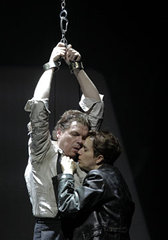| Opera Reviews | 26 April 2024 |
A notable eventby Moore Parker |
|
| Beethoven: Fidelio Theater an der Wien 19 March 2013 |
|
|
The setting, which could represent a state penitentiary on any continent (and dated only vaguely by a mechanical typewriter in Act 1) through its repressive gunmetal-grey structures, (design, Rolf Langenfass) adeptly converts via the revolving stage from an intimate office, to prison courtyard, to Florestan's quarters of solitary confinement. On occasions, effect rather than logic risk sabotaging the moment: a flurry of snow falling in Rocco's Act 1 rooms, Florestan's access to a box of matches in his great Act 2 aria, and the decision not to free the suffering prisoner from his hanging chains for "O, namenlose Freude", are just three examples. However, there is much which captivates in this production - in particular the direction and character definition of the protagonists. Act 1 flows with a taut sense of drama, ending with stunned silence as Pizarro assassinates a squirming photographer (who has evidently fallen out of favour) with a single shot to bring down the curtain. Act 2 (after its wonderfully atmospheric introduction in the pit) opens to an absolutely black stage for "Gott, welch'Dunkel hier!", creating a curious empathy with the invisible victim - a bond which suffers awkwardly when shattered by Florestan's striking of a match and an instant moment of light. From Pizarro's entrance, the staging tends to unravel somewhat - partly due to the placement of the protagonists, partly due to ineffective lighting in which the prison cell takes on the ambience of a large cardboard box. The staging effectively ends with "O namenlose Freude", with a sudden transfer to a concert setting in which chorus and soloists appear in black dress, and Don Fernando enters as a Beethoven, finger-wagging, look-a-like. As the work draws to its close, the pit - and subsequently the auditorium - are united with the stage through a flood of light. The main protagonists (directed by Herbert Föttinger, here in his operatic debut) are hard-shelled victims - yet perpetrators - in a totalitarian system within which each pursues his element of power according to rank. Here, Marzelline (serving her father as a uniformed secretary) barks just as much as Pizarro - but with an authority that cowers to Rocco. He, in turn, is not the affable warmhearted father but a corruptible moneygrubber - an aggressive and violent bully who recoils only at the thought of murder, which falls beyond his list of "duties". Lars Woldt (making his house debut) appears an ideal choice for this interpretation. More bass-baritone than bass, with a biting command and cutting upper range to match an offensively-officious presence, this is one outstanding Rocco. Juliane Banse is a subtle and unusually credible Fidelio, with sufficient vocal warmth and thrust of tone to compliment the ensemble and to fill the house at all times. A noble and memorable interpretation. Martin Gantner (an imposing Albert in the production of Werther in this house) is a powerful performer, who well-utilizes his assets as Pizarro. The voice lacks the ideal weight and lower register, but through a clever combination of intelligent vocalizing and interpretation, this becomes a figure to be reckoned with. Anna Prohaska, won the audience with her attractive, accurate, and unusually feisty Marzelline, well-partnered by Johannes Chum - an excellent foil as Jaquino, both vocally and dramatically. Garry Magee faced a difficult task as Don Fernando in this setting. Evidently a cultivated singer, he nevertheless (at this stage in his career at least) lacks the vocal authority and stage personality to accord this interpretation credibility (whereby the concept for the entire scene remains dubious). Of all the leads, Florestan remains perhaps the least convincing. Michael Schade - with a combination of Mozart, Strauss and Wagner in his stable of roles - brings his customary musicality, taste and intelligence to Beethoven. While lightweight (as is the case with Juliane Banse) in comparison to many predecessors, the concept remains viable in this venue (and with appropriate support from the pit) - however, an element of this reading remains on the drawing board, presumably to mature in time. As in last year's Salzburg Die Zauberflöte, the engagement of Concentus Musicus Wien is of unquestionable interest. The variety of instrumental colours (albeit with mishaps in the brass section), and the sensitive and - in this case - refreshingly non-self indulgent reading by Nikolaus Harnoncourt makes for vital and moving experience, which deserves a chapter in the annals of the Theater an der Wien's history. |
|
| Text ©
Moore Parker Photo © Moritz Schell |

 Fidelio
at the Theater an der Wien, considering the venue's intimate association
with the composer and the work - and particularly with this constellation
of artists, is a notable event.
Fidelio
at the Theater an der Wien, considering the venue's intimate association
with the composer and the work - and particularly with this constellation
of artists, is a notable event. 





